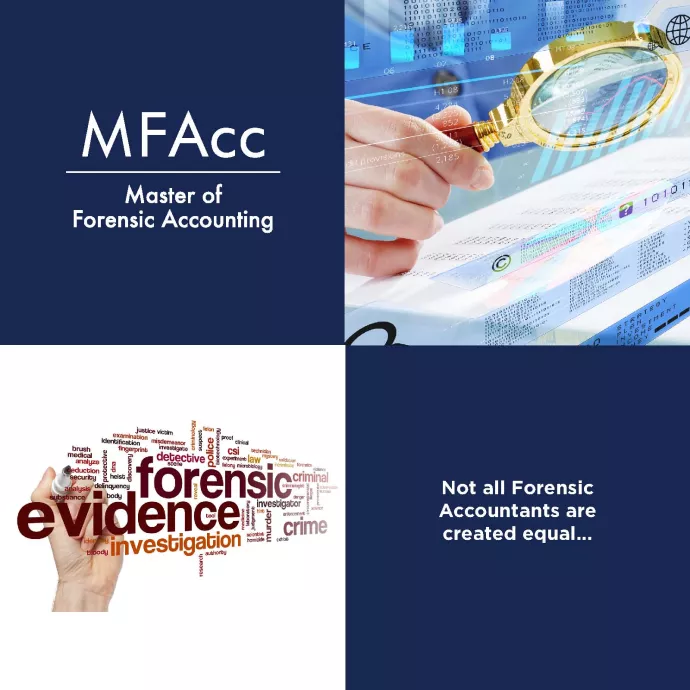
» The MFAcc Program is a 2-year, course-based, graduate professional degree program housed within the Institute for Management & Innovation (IMI) at the University of Toronto’s Mississauga campus (UTM). The MFAcc Program is offered part-time, using a state-of-the-art online, interactive, learning format designed to be accessible and convenient for the working professional, whether international or domestic.
The MFAcc Program is tailored specifically for professionals in accounting, business, or law seeking a Master's degree that serves as a gateway into various industries, non-profit organizations, and both public and private sectors.

The MFAcc program starts annually in September and is designed to align with the changing requirements of both our students and the industry. It addresses challenges related to investigating fraud, various facets of white-collar crime, money laundering, and other financial disputes. Furthermore, the program focuses on delivering reports, advice, and evidence to clients, lawyers, and courts for the resolution of situations pertaining to potential or ongoing civil or criminal legal proceedings.
Recruitment officers from MFAcc engage with potential applicants for the MFAcc program throughout the year. If we were unable to connect with you in-person, we are thrilled to present a digital edition of the MFAcc brochure typically distributed during our in-person sessions and at conferences.
This electronic brochure offers a comprehensive glimpse into the MFAcc program, covering aspects such as admissions, industry opportunities, and the forensic accounting community.
» Nature of IFA
The growing complexity of personal and organizational interactions and an increased appetite for formalized methods of dispute resolution have combined to heighten the need for accountants skilled in investigation and resolution of financial disputes in both civil and legal proceedings. Investigative and forensic accounting is the rigorous investigation of the financial aspects of a particular situation, usually with the objective of establishing evidence relating to possible or pending criminal or civil legal proceedings. It involves the investigation of situations where "white collar" crime is suspected and also those where a dispute needs to be resolved.
Fraud, money laundering, supplier kickbacks and other examples of "white collar" crime represent a serious threat to business competitiveness. Accountants are increasingly involved with the investigation of these activities and of the investigation of economic losses due to damages to businesses, property or personal injury. While the demand for forensic accountants has been said to be increasing by 100 percent per year there is a dearth of university courses and programs designed to educate forensic accountants.
The IFA practitioner requires a broad range of knowledge and skills to carry out financial investigations. These include: accounting, audit, and income tax knowledge; fraud knowledge; knowledge of law and rules of evidence; an investigative mentality and critical skepticism; understanding of psychology and motivation; and, strong communication skills.
» Designations & Specializations
Students enrolled in the MFAcc Program will be able to apply for the following credentials in forensic accounting after they graduate:
Masters
All graduates of the program will have earned a masters degree from the University of Toronto and will be able to use the initials “MFAcc” after their name to indicate their level of expertise to their employers, their clients and the legal profession.
Certified in Financial Forensics (CFF)
CPA Canada, formerly the Canadian Institute of Chartered Accountants (CICA) in association with the American Institute of Certified Public Accountants (AICPA) now offers the Certified in Financial Forensics (CFF) credential to members of CPA Canada.
The CFF credential recognizes CPAs who have demonstrated extensive knowledge, skills and experience in forensic accounting. More information about the CFF program can be obtained at the AICPA web site.
The MFAcc fulfills the educational and exam requirements of the CFF credential. Upon graduation from the MFAcc program, CPA Canada members need only fulfill the business experience requirement to obtain the CFF credential.
CPE and CPD Requirements
If a member is licensed there are mandatory continuing professional development hours that must be met - MFAcc courses meet these requirements. Also, Alumni are invited to online educational, industry based lectures, at no charge, 3 - 4 times a year to fulfill some of the required CPD credits.
“I found the courses to be very relevant to work in the field..; When I started the program, I did not work in forensic accounting. I obtained employment in this field in just 3 months before completion of the program. When I received my first file to work on, I felt like I was just handed a group assignment in Loss Quantification to complete.” Beata Laskowska, CPA, CGA, DIFA, CFF DIFA Graduate
